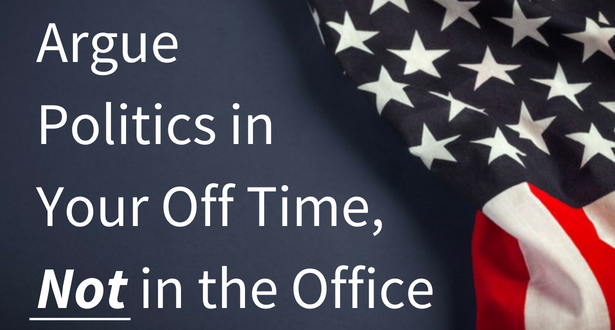Office politics are one thing – knock-down, drag-out political debates that disrupt your workplace are quite another.
Sure, the presidential election is over, but what’s that old saying? “It’s all over but the shouting?” Well, an increasing number of managers are finding themselves in the uncomfortable position of referee as their employees continue to debate election results, policy decisions, and national headlines.
I recently e-mailed with executive coach Amanda Mitchell, who explained, “I’ve never encountered such divisiveness in the workplace. It used to be that people left their personal politics at home. Now, they’re texting and tweeting from their desks about the new President, about Congress, about what might have been, and what’s happening in Washington. And what suffers? Productivity – actually getting work done.”
Mitchell founded Our Corporate Life, which helps companies address workplace dysfunction, politics, and bureaucracy. She works with companies and their employees to address the unnecessary corporate insanity that impedes performance and inhibits innovation by working one-on-one with senior executives to increase leadership skills and working with teams to reduce disruptive drama.
The political tension is hard to miss in many workplaces, according to Mitchell, and that’s bad news for managers. “When one staffer is ranting over the latest headline, and another is taking the opposite view, the distraction takes everyone’s collective eye off the ball – that is, the task at hand.”
Mitchell shared a few management strategies to deal with disruptive politics at work:
Make Like the Swiss
Switzerland’s neutrality is something a manager might consider emulating, said Mitchell. “Stay out of break room squabbles and water cooler debates. If you have an opinion – and who doesn’t? – keep it to yourself.”
A Busy Staff is a Happy Staff
Be sure to redirect all that political passion to the job at hand. Managers might consider assigning special projects to the loudest political debaters – maybe get two with opposing views to work together? And be sure to supervise the process and praise the results. “Nothing like a pat on the back, no matter what your political persuasion,” said Mitchell.
Distract to Deter
Management might consider disrupting the routine, by scheduling a team-building seminar or employee recognition lunch. Most offices have a familiar pace and it may be that staff rely on down time to kick start political dramas. Mitchell recommends that managers keep staffers motivated by changing things up a bit.
Got a Problem Employee?
It’s not unusual to have one staff member who gets easily distracted with what’s going on in the world. “It’s hard to disconnect from what’s going on, even in the office,” Mitchell admitted. If one individual is triggering the political drama, managers should take direct action, speak privately with the staffer, and help them understand that paying attention to their work is the priority on company time.
Above and Beyond
“Some people think we’re on a course toward disaster, others think all will be well,” said Mitchell. “We usually react to uncertainty and personal anguish – and yes, some people are feeling that! – by being easily distracted, procrastinating, or feeling that no matter what the work output, who cares?” A good manager leads by example, said Mitchell, and keeps the focus on high standards and a job well done.
Will the politicking – on social media, in cafes, on street corners, and in the office – ever end? At some point, the dust will settle, Mitchell believes. In the meantime, “When it comes to work, we all have to remind ourselves what’s important: providing for ourselves and our families by doing a good job, earning a living, and taking pride in ourselves and our accomplishments,” said Mitchell.



